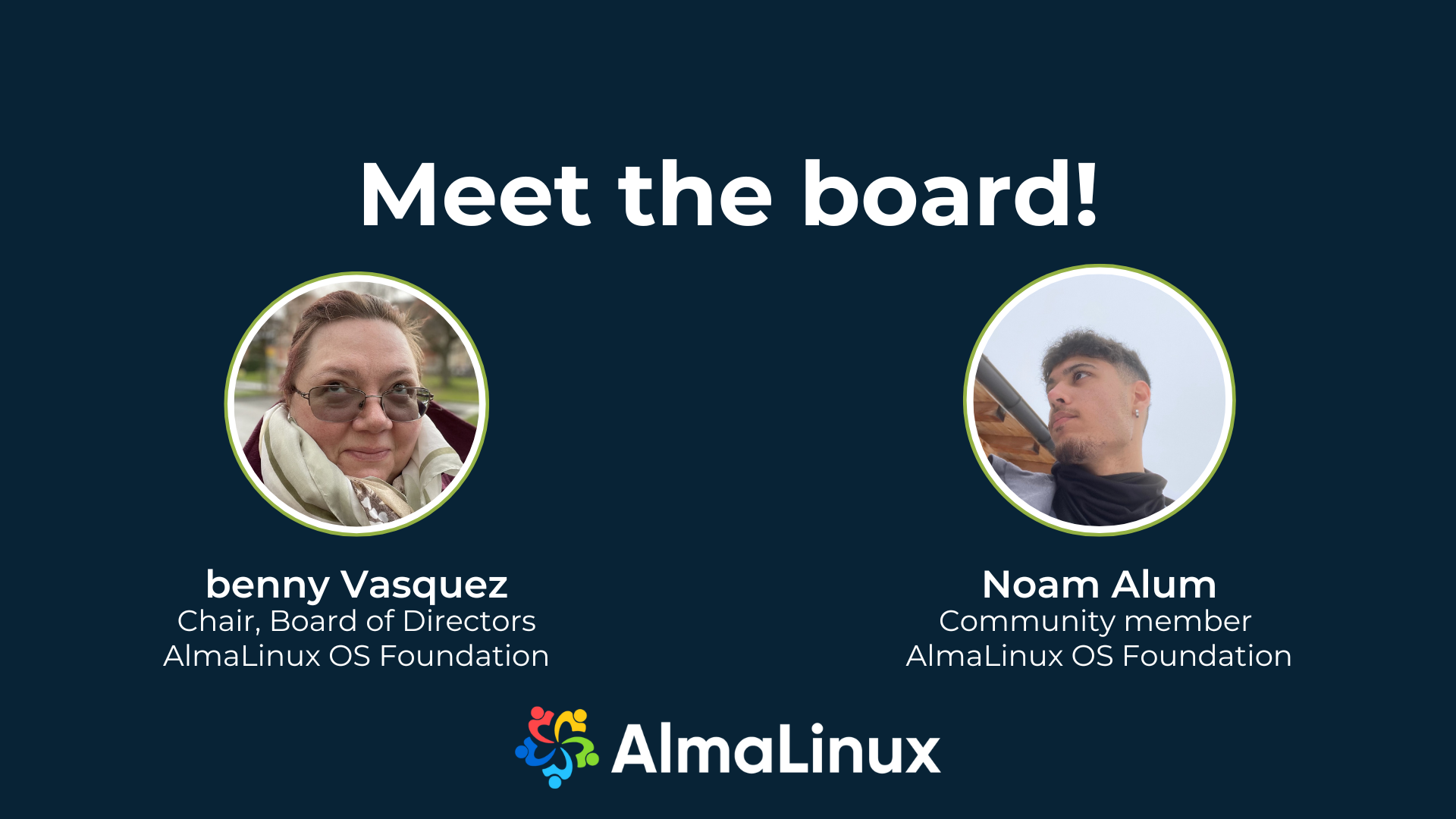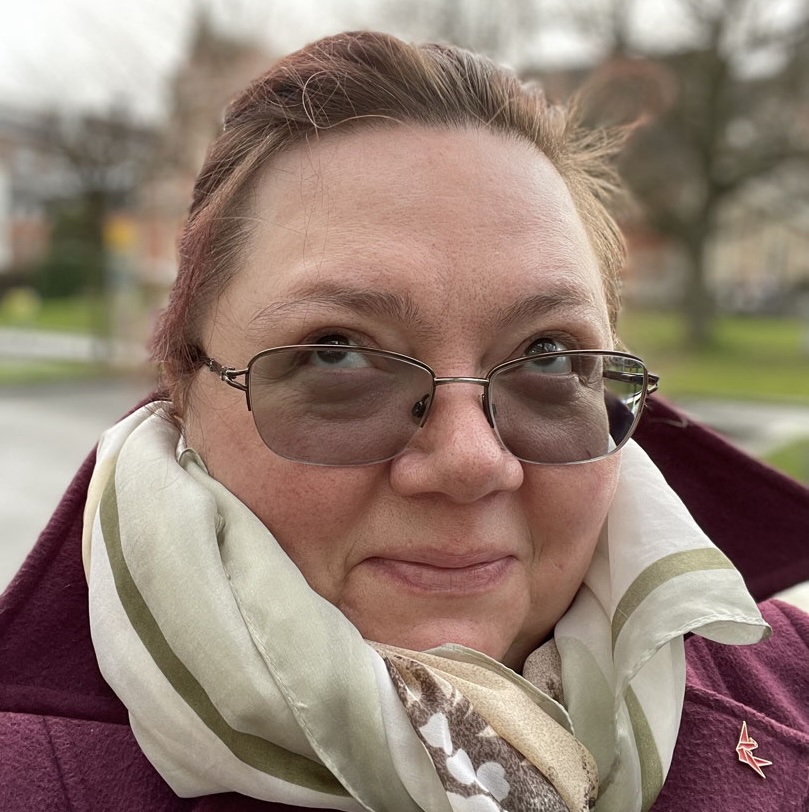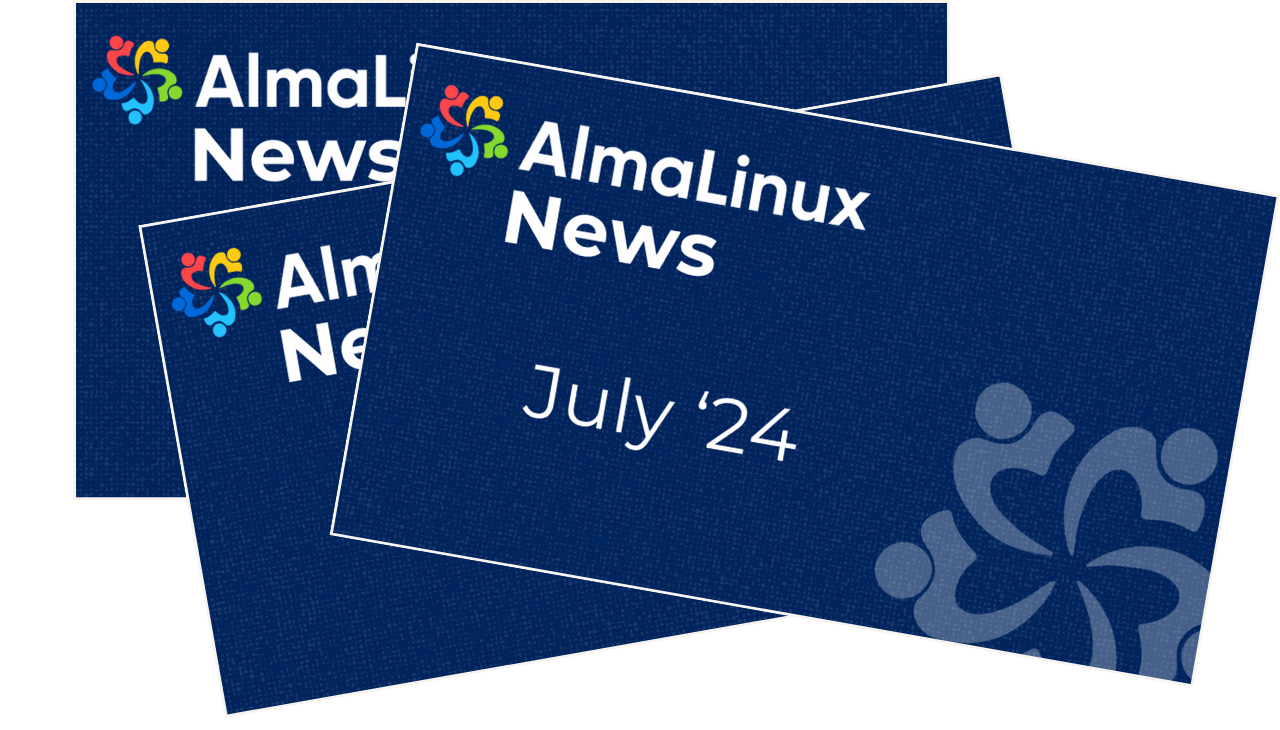
In 2023, we launched a series in which we have community members answer common questions we’re seeing from the community. Last year we have started building another Q&A series - this time with the AlmaLinux OS Foundation board members! Our goal with this new board member Q&A series is to better introduce our board to the broader community.
For our latest board member Q&A video, Noam Alum interviewed me, benny Vasquez. We talked about how I got started with Linux, my hopes for AlmaLinux, and some other fun things. Learn a bit more about me and my background by watching the video, or check out the transcript below!
Learn more
The AlmaLinux OS Foundation’s board is community elected, by members of the AlmaLinux OS Foundation. If you use AlmaLinux, contribute to AlmaLinux, or support AlmaLinux in some way, we encourage you to join the foundation. Individual membership is free, because you shouldn’t have to pay to have a voice in the future of something you care about.
See the other interviews here:
- In September, we interviewed Jack Aboutboul: Meet the board - Jack Aboutboul
- In September, we interviewed Jun Yoshida: Meet the board - Jun Yoshida
- In October, we interviewed Alex Iribarren: Meet the Board: Alex Iribarren
We also had a panel of board members at AlmaLinux Day: Germany in 2024 where board members talked about everything from how they got involved in AlmaLinux to their feelings about the future of open source, which you can watch on YouTube Meet the board!
If you’d like to learn more about our board and elections, you can check out our Wiki! You can also watch the other videos in this series in this YouTube playlist.
Transcript
Note: This transcript has been edited for clarity and readability.
Noam Alum: Hey everyone. I’m Noam Alum, a member of the AlmaLinux community. I’m here with benny from the AlmaLinux Foundation. And we are going to introduce you a bit more to the AlmaLinux community. How are you doing today, benny?
benny Vasquez: I’m good. Thanks, Noam. I am very excited to be here.
Noam Alum: Great. Let’s jump right into it. What got you into open source in general and Linux specifically?
benny Vasquez: So my first Linux distribution was CentOS. I guess technically, it was Ubuntu when I checked my email on my boyfriend’s computer once. But when I got into web hosting, the primary OS that we used was CentOS, so that was my first. And it has had a very special place in my heart ever since then. Later on, when I started to learn about open source, I loved the community nature of open source in general, I loved the idea that just a bunch of people that care about something could work together on it and, like, allow your passion to drive something cool. And eventually that led me to AlmaLinux.
Noam Alum: And that’s why I’m talking to you today.
benny Vasquez: Yeah!
Noam Alum: I want to ask you, what are the most exciting things to you about AlmaLinux? And where do you see it in the next five years?
benny Vasquez: I think the most exciting thing that we’re working on for me is the foundation of what we’re going to build on. I think CentOS was around for 20 years, like the historic CentOS was around for 20 years, and the project still exists. And for me, setting up a foundation that will allow this project to continue to thrive and continue to exist, outlast anybody who’s involved in it right now, their interest, their abilities, their passion for it. I really want us to continue to be around as long as we can. So that’s what’s exciting for me. It’s maybe not sexy, but it is the most important thing, from my perspective, to make sure that we’re setting up a strong foundation.
Noam Alum: Yeah. That’s nice. You mentioned web hosting, and that’s where I came to know you.
benny Vasquez: Yeah.
Noam Alum: Most people won’t know your history. And I thought maybe you could expand a little bit.
benny Vasquez: Yeah, absolutely, I forgot. Most people don’t really know my background. So, I got started in tech in high school. I was helping my dad. He was an IT director at a really small school district, about 20 miles from here. And we would, over the summer, we would do complete rebuilds of all of the computer labs. So I got really familiar with all of that stuff, and really started to understand computing there. But after high school, I went to a local community college and tried a bunch of different majors, none of which were computers. I did archeology, biology, and a ton of things that none of which really stuck for me. None of them seemed to fit, but they were all interesting. And then, after failing out of college, I did some contract work that actually pulled on the knowledge that I had built with my dad, working with my dad and then started at a web hosting company called Liquid Web here in Michigan. I was employee number 33. I was the first girl. It was a very small company. But my A.D.D. ended up being the perfect way for me to enter that company, because there was a position that we called monitoring where you just stared at a screen that was full of alerts all day, and worked to resolve those. Me and my Nagios screen were best friends. And then I got to build the monitoring team and the infrastructure that we used and started to really understand a little bit more about open source there, and then got involved in the marketing side of things there, because I could speak tech and knew people. And I understood how to interact with people. And I started to understand the community a lot more there. And then I went to cPanel and worked there doing tech support and then doing community engagement and community building there. And what was really remarkable about that spot was that cPanel really cared about making sure they were giving back to the open source projects that they relied on. So I got to learn a lot more about what responsible open source consumption was. And, got to meet a bunch of people that were in open source and then moved to Chef to try to help them bounce back from some problems that they were having in their community with their engagements. And I then briefly worked at Microsoft on the open source ecosystem team, which really was my first, like, head first, deep into open source, outside of AlmaLinux. I had already joined the board, and so I was already active in the project, but that was a completely new approach to open source for me, because what Microsoft does is, employs people to work at open source projects pretty regularly. And for me, it was the OpenSSF. So I got to work at the Linux Foundation, but got paid by Microsoft, and that was fantastic. Then, when I got laid off from Microsoft last year, it was the perfect time for me to do AlmaLinux, full time, because there were a bunch of changes at Red Hat that impacted us. And so I got sponsored to do that, and I have been doing that for just over a year now, about fourteen months, and it’s been awesome.
Noam Alum: That’s such an amazing journey. I hope mine would be somewhat like yours. And like it seems like you wouldn’t know what would be, your life as an adult. And that brings for me, the question - what was your dream job was like as a kid?
benny Vasquez: I’ve always liked fast things and adrenaline highs. And when I was a kid, I thought I wanted to be a fighter jet pilot. And then I realized that that would require military interaction. That’s not really for me. That’s not something that I’m good at. So then, I thought maybe I would use my ability to argue and reason to be a lawyer and help people specifically. But by the time I was an adult, none of those were really a fit for me. And all I knew was that I wanted to be able to help people and do something with technology. And honestly, I had no idea where that was going to take me. But yeah. That’s the dream.
Noam Alum: Well, thanks for joining me today. And thanks for letting the community know you a bit more.
benny Vasquez: Thank you. Thank you, Noam!

